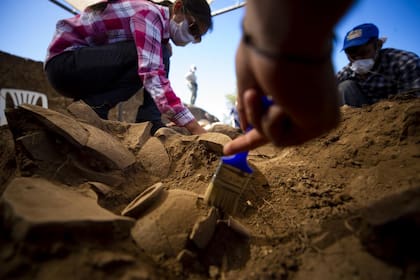An ancient hoard of Persian coins offers insights into the political landscape around the time of the Peloponnesian War.

It is the late fifth century B.C. and a mercenary soldier kneels in his modest quarters, digging a hole in the earthen floor. He places a small jug, called an olpe, in the hole for safekeeping and covers it with dirt. In the olpe are his savings — scores of gold coins, known as darics, each one equal to a month’s pay.
But something happens to the soldier — possibly something sinister — and he never retrieves his hoard, which remains undiscovered for the next 2,400 years.
That is one of several scenarios proposed by Christopher Ratté, an archaeologist at the University of Michigan, to account for the cache, which he and his research team recently unearthed from the ruins of Notion, an ancient city-state in modern-day Turkey. While digging beneath the courtyard of a house dating to the third century B.C., the excavators found the remains of an earlier dwelling. “The coins were buried in a corner of the older building,” Dr. Ratté said. “We weren’t actually looking for a pot of gold.”

Darics were chiefly used to provide payment to soldiers of fortune. Andrew Meadows, an archaeologist at the University of Oxford who was not involved in the project, said he knew of no other hoard of this type to turn up in Asia Minor. “This is a find of the highest importance,” he said. “The archaeological context for the hoard will help us fine-tune the chronology of Achaemenid gold coinage.”
The archaeological site at Notion spans 80 acres atop a promontory in western Anatolia, a borderland dividing Asia from Europe. It was one of the Greek-speaking communities that emerged in the region during the early first millennium B.C., perhaps because of migration across the Aegean Sea. The deposition and loss of the Notion hoard occurred at a time of warfare, insecurity and great power machinations in a contested frontier zone.
“This was true in deepest antiquity, as remembered in the story of the Trojan War,” Dr. Ratté said. “And it remains true to this day, as demonstrated by the Syrian refugee crisis.” He noted that the small harbor on the east side of the city was one of the departure points for Syrian refugees who fled across Turkey to Europe during the refugee crisis a decade ago.
Anatolia is the birthplace of the Western world’s first state-issued coin, the stater, which was created by a seafaring people called Lydians. King Alyattes standardized the weight and design of the Lydian stater, which, beginning around 610 B.C., was struck in electrum, a natural alloy of gold and silver. The king’s son and successor, Croesus, is credited with minting the first true gold coin, the Croeseid. The expression “rich as Croesus” refers to his extravagant wealth as well as the opulence of Lydia during his rule.
Image

Image

In 546 B.C., the entire area, known as Ionia, was conquered by the Achaemenid Persian Empire. Although Croesus was defeated in battle by Cyrus the Great, his gold-based monetary system lived on. The Persians continued to manufacture Croesids until they introduced their own bimetallic currency, made up of silver and gold coins. The silver coins were called sigloi, and the gold ones were darics — a name derived from either Darius I, who ruled the Persian Empire from 522 B.C. to 486 B.C., or dari-, the root of the Old Persian word for gold.
In 427 B.C., according to the Greek historian Thucydides, an Athenian general named Paches attacked and killed a troop of pro-Persian mercenaries at Notion after luring their commander into a trap. The Persian sympathizers were then expelled, and Notion was reorganized under Athenian supervision.
Two decades later, a decisive naval battle in the Peloponnesian War between Athens and Sparta was fought off the coast of Notion, which the Athenians had been using as a naval base. Dr. Ratté said that the gold hoard might have been connected to the events of 427 B.C., or later, with the Athenian evacuation of Notion.
“It is possible it was not associated with either of these dramatic events,” he said, “but was simply the savings of a veteran mercenary soldier in a time and place when soldiers of fortune could make a lot of money if they were willing to risk their lives for the highest bidder.” Many Greeks fought for the Persian Empire, including the Athenian historian Xenophon, who was an active mercenary for the Persian prince Cyrus the Younger from 401 B.C.- to 400 B.C. — the same time period when the Notion hoard was tucked away.
In 387 B.C., within a generation after the Athenians were defeated by the Spartans, Notion and the other cities of Ionia were reintegrated into the Persian Empire. They remained Persian possessions until the conquest of Alexander the Great in 334 B.C., at which point production of the daric quickly declined. Alexander and his immediate successors had many of the existing gold pieces melted down and recast as coins bearing their images, making darics rare today.
The Notion darics are stamped on the front with a likeness of the Persian king kneeling in a long tunic. In his left hand is a bow; in his right, a long spear. The backs of the coins are blank, except for a punch mark. The hoard is being stored at the Ephesus Archaeological Museum in nearby Selcuk, Turkey, along with imported Athenian pottery that was recovered at the dig.
Dr. Ratté believes that the fact that the loot was never reclaimed is a clear sign of disaster. “No one ever buries a hoard of coins, especially precious metal coins, without intending to retrieve it,” he said. “So only the gravest misfortune can explain the preservation of such a treasure.”





